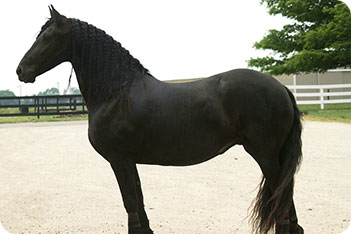
Colic In Horses
Horse Colic • Equine Veterinary
From: Equestrian and Horse | Horse Ailments

Colic In Horses
This can be a very painful and life threatening problem that affects the horses digestive system and causes extreme abdominal pain. There are many different causes and being able to spot the signs of early colic will give you the greatest chance of assisting your horse to recover.
The Challenge
- Trying to determine exactly where the problem is.
- What has caused the colic.
- What type of colic.
- How best to treat the colic, and with the added challenge that horses cannot physically be sick due to their sphincter muscle at the base of the esophagus preventing them.
Symptoms And Signs
- Sweating profusely or patchy sweating.
- Restlessness combined with frequently rolling.
- Kicking up at their bell.
- Pawing the ground.
- Turning to look around at their belly.
- Lack of bowel movements.
- Refusing to eat.
- Increased pulse rate.
- Looking unhappy and distressed.
- Increased breathing rate.
What To Do
Call your veterniary surgeon immediately!
Types Of Colic:
Impaction Colic
This is where a build up of food quite literally gets stuck or impacted within the colon of the horse. Where the colon narrows and doubles back on itself it causes any build of food to gets stuck, thus preventing the food from passing.
Spasmodic Colic
Over activity of the intestines causes the intestines to go into spasms. Can be caused by the horse quickly drinking a large amount of cold water or food not digested or chewed properly.
Sand Colic
Sand that is either eaton or drunk ends up being collected in the colon and caecum of the large intestine, it is here that the sand causes inflammation inside the intestine and outward symptoms such as diarrhoea.
Enterolith
This is where a ball of mineral deposits accumulates around a foreign body that causes a blockage within the intestine of the horse.
Parasite Colic
Parasites can cause blockages as well as ruptures to occur within the intestines of the horse.
Displacement Colic
This is where part of the bowel becomes trapped and/or displaced and will often need surgery to correct the problem.
Twisted Gut
This is where part of the horses intestines becomes twisted, this causes blood flow to be cut off with surgery being required to treat the problem.
Intussusception
This is where part of the intestine prolapses and enters into another part of the intestines with surgery being the only corrective treatment.